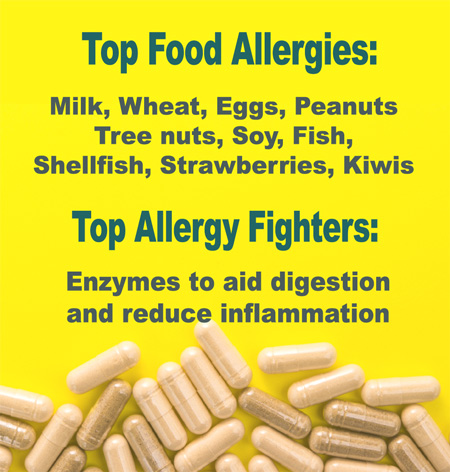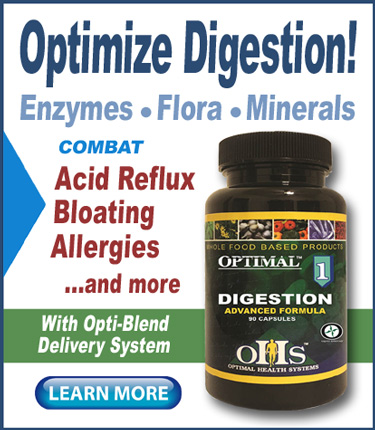The rate of children hospitalized for food-induced anaphylaxis rose by 25% from 2006 to 2012. This is according to a 2019 analysis of data from hospitals in the United States and published in Pediatric Emergency Care. And severe symptoms were more often linked to milk than to peanuts or tree nuts, the study showed.
Meanwhile, in the United Kingdom, the British Medical Journal is reporting the rate of hospital admissions for food-induced anaphylaxis more than tripled over the 20 year period from 1998 to 2018.
As dismal as this news is, there is a silver lining: Consumers are discovering that digestive enzymes can offset common food sensitivities—and can even reduce symptoms of full-blown food allergies
Enzyme sales on the rise as consumers seek relief
According to marketing research company, Transparency Market Research, the global market for digestive enzymes has been growing at about 13% since 2016. Global sales are expected to exceed $1 billion in 2025.
When Transparency Market Research provides the reasons for the fast growth, their statement sounds just like what you might hear from your naturopath: “These densely populated fast-expanding large economies have a sizeable chunk of their population suffering from digestive disorders on account of fast-paced lifestyle which has resulted in untenable eating habits. This, in turn, has boosted demand for digestive enzyme supplements.”
For those of us living in America, the evaluation is even more blunt: “North America runs the show due to unhealthy eating habits of its people.”
And it’s these unhealthy eating habits that destroy a person’s built-in enzymatic system, leaves them prone to inflammation, and ultimately destroys their immune system.
The root cause of food intolerance is an inability to digest certain foods due to lack of an inherent digestive enzyme—resulting in digestive discomfort. That’s where supplemental digestive enzymes can be especially helpful.
In the case of milk, it is the lactose-–which makes up 2% to 8% of milk by weight—that is creating a digestive problem with so many people. This is why “lactose intolerance” is in the news so much.
Lactase is the enzyme that breaks down lactose for digestion and absorption. Lactase can be found in quality enzyme supplements, such as Optimal Digestion from Optimal Health Systems.
Allergy versus intolerance (or sensitivity)
When people experience an unpleasant reaction to something they’ve eaten, they assume they have a food allergy; however, it is more likely not to be the case.
According to Dr. Anthony J. Cichoke, author of The Complete Book of Enzyme Therapy, although approximately 40 percent of Americans believe they have food allergies, only about 1 to 3 percent of Americans actually suffer from a real food allergy. What many believe is an allergy may simply be a food intolerance.
Fortunately, says Dr. Cichoke, supplemental enzymes can help both conditions.
Only a handful of foods that produce allergies are responsible for the vast majority of all allergic reactions. It’s typically the protein component of a particular food that triggers an allergic reaction.
Although the immune system is involved in allergic reactions to food, it is not responsible for the symptoms of food intolerance—although the symptoms may be similar.
A food intolerance usually occurs because the body lacks the enzyme necessary to digest a specific food. A food allergy, on the other hand, is an abnormal immune response to food. A protein in the food is usually the problem, and it triggers the release of inflammatory chemicals such as histamine. This immune response can range anywhere from slight to extremely dangerous.
Help activate your immune system with enzymes!
Enzyme therapy is especially effective at fighting allergies because enzymes can break down protein allergens and work to block the process that causes an allergic reaction.
Enzymes also stimulate immune activity and bolster immune system function by promoting growth of healthy intestinal flora. Systemic enzyme therapy is used to decrease inflammation, to improve circulation, to break down and transport nutrients throughout the body, and to remove waste products from the body.
A note of caution: although enzymes can help allergies, individuals suffering from severe food allergies should strictly avoid any food to which they know they are highly allergic. You should address serious allergies with the aid of your health professional.
The industry’s top enzyme product!
Optimal Health Systems recognized the value of enzyme healing over two decades ago. Optimal 1-Digestion was developed and launched long before the trending popularity of other “enzyme products” available today.
Optimal Digestion includes other ingredients—such as minerals and probiotics—that you won’t find in other formulas.
And if you’re one of those people who has a lactose sensitivity, you’ll love the fact that each capsule provides thousands of active units of a premium lactase that was specially formulated to remain effective in all pH levels of the gut.
Click the banner ad on this page to learn more.
– – –
Sources: Medscape.com, Pediatric Emergency Care, British Medical Journal, The Complete Book of Enzyme Therapy.



